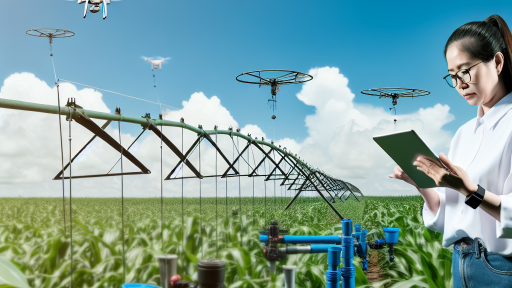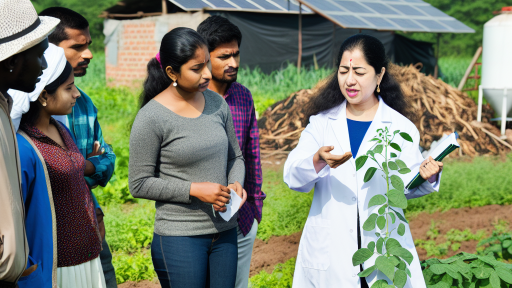Understanding the Importance of Agricultural Trade Policy
Facilitating Trade and Economic Growth
Agricultural trade policy plays a crucial role in facilitating trade.
It opens markets for farmers and producers worldwide.
Furthermore, it stimulates economic growth within nations.
By lowering tariffs, countries can enhance their agricultural exports.
This increase benefits not only farmers but also local economies.
Ensuring Food Security
A robust agricultural trade policy contributes to food security.
It ensures a steady supply of food products in diverse marketplaces.
This supply can help stabilize prices and availability during crises.
Additionally, it supports countries in meeting their nutritional needs.
Strong export capabilities allow for a more resilient food system.
Promoting Sustainable Practices
Trade policy encourages sustainable agricultural practices.
It creates incentives for eco-friendly methods of production.
For instance, countries can promote organic farming through trade agreements.
By doing so, they can mitigate climate change and preserve ecosystems.
Moreover, sustainable trade practices can enhance food safety standards.
Transform Your Agribusiness
Unlock your farm's potential with expert advice tailored to your needs. Get actionable steps that drive real results.
Get StartedSupporting Global Relationships
Agricultural trade policy fosters international relationships and cooperation.
Strong trade ties can lead to collaborative efforts in agriculture.
Countries can share best practices through mutually beneficial agreements.
Such cooperation can enhance diplomatic relationships as well.
In sum, effective policies can lead to a more interconnected world.
Adapting to Global Changes
The agricultural sector must adapt to global market dynamics.
Trade policies should respond to changing consumer preferences.
For example, the rising demand for organic products influences trade agreements.
Additionally, policies must consider environmental impacts and sustainability.
Flexibility in trade policies is vital to address emerging challenges.
Key Components of Effective Agricultural Trade Policies
Market Accessibility
Market accessibility remains a crucial component of agricultural trade policies.
Policies should facilitate easy entry for farmers into local and international markets.
These measures may involve reducing tariffs and eliminating trade barriers.
Promoting transparent trade practices builds trust among trading partners.
Additionally, strong logistics networks ensure timely delivery of goods.
Quality Standards and Regulations
Establishing quality standards helps ensure product safety and consumer trust.
These regulations impact export eligibility and market competitiveness.
Compliance with international standards enhances market access opportunities.
Countries must balance strict regulations with the need for agricultural growth.
Moreover, ongoing assessment of standards keeps pace with industry innovations.
Support for Local Farmers
Supporting local farmers is essential for sustainable agricultural policies.
Policies should offer financial assistance for farmers to compete globally.
Training programs can equip farmers with the skills required for modern farming.
Collaboration with agricultural associations fosters knowledge sharing.
Showcase Your Farming Business
Publish your professional farming services profile on our blog for a one-time fee of $200 and reach a dedicated audience of farmers and agribusiness owners.
Publish Your ProfileThis support ultimately boosts farmers’ resilience against market fluctuations.
Trade Agreements
Trade agreements shape the landscape of international agricultural trade.
They create clear rules and expectations for all parties involved.
Effective agreements eliminate tariffs and open up new markets for exports.
Countries should negotiate terms that benefit their agricultural sectors.
Furthermore, regular reviews of existing agreements ensure relevancy and fairness.
Research and Development
Investing in research and development drives agricultural innovation.
Policies should encourage partnerships between government and research institutions.
This collaboration fosters advancements in crop yield and pest management.
In turn, innovation can lead to more sustainable farming practices.
Additionally, R&D efforts can improve food security and environmental health.
Best Practices for Negotiating Trade Agreements in Agriculture
Preparation and Research
Knowledge is vital before entering trade negotiations.
Conduct thorough research on market needs and demands.
Analyze the strengths and weaknesses of your agricultural products.
Understand the economic conditions of your trading partners.
This helps anticipate potential challenges and opportunities.
Clear Objectives and Goals
Establish clear objectives before negotiations begin.
Define what you aim to achieve from the trade agreement.
This could include improved tariffs, or expanded market access.
Align your objectives with your overall agricultural strategy.
Building Relationships
Develop strong relationships with negotiating partners.
Fostering trust can lead to more successful outcomes.
Regular communication can strengthen partnerships over time.
This approach can also help defuse tensions during negotiations.
Cultural Awareness
Understanding cultural differences is crucial in trade negotiations.
Respecting local customs can facilitate smoother discussions.
Be adaptable to diverse negotiation styles and practices.
This knowledge can prevent misunderstandings and build rapport.
Effective Communication
Clear and concise communication is essential.
Use language that is straightforward and easy to understand.
Listen actively to your partners’ concerns and feedback.
Encouraging dialogue fosters cooperation and understanding.
Flexibility and Adaptability
Be prepared to adapt your strategies during negotiations.
New information and shifting dynamics may require adjustments.
Flexibility allows for creative solutions to emerge.
This can lead to mutually beneficial agreements for all parties.
Utilizing Expert Advice
Seek expertise from professionals when necessary.
Consulting agricultural economists or trade specialists can provide insights.
Expert guidance can enhance your negotiation strategy.
Capitalize on their knowledge to support your objectives.
Showcase Your Farming Business
Publish your professional farming services profile on our blog for a one-time fee of $200 and reach a dedicated audience of farmers and agribusiness owners.
Publish Your ProfilePost-Negotiation Review
Review the negotiation process after completion.
Assess what worked well and identify areas for improvement.
This reflection can help enhance future negotiations.
Learn from each experience to refine your approach.
Discover More: Compliance with Export Regulations
The Role of Technology in Modern Agricultural Trade Policies
Introduction to Agricultural Technology
Technology plays a critical role in agriculture today.
It enhances productivity and efficiency in trade policies.
Farmers now rely on advanced equipment and software.
This reliance helps them meet market demands effectively.
Precision Agriculture
Precision agriculture transforms traditional farming methods.
It utilizes data analytics, GPS, and remote sensing.
This technology enables targeted resource allocation.
Consequently, farmers can optimize yields and reduce waste.
Supply Chain Management
Technology improves supply chain management in agriculture.
Real-time tracking systems ensure timely deliveries.
This system minimizes losses due to spoilage or delays.
Additionally, it enhances transparency in trade practices.
Market Access and E-commerce
Digital platforms expand market access for farmers.
They can now sell directly to consumers through e-commerce.
This shift reduces reliance on intermediaries.
Thus, farmers enjoy better prices for their products.
Data-Driven Decision Making
Data analytics aids in informed decision-making processes.
Farmers analyze market trends and consumer preferences.
This knowledge helps them adapt their strategies effectively.
As a result, they can align production with market needs.
Challenges of Technological Adoption
Not all farmers can easily access advanced technology.
Cost barriers often limit technology adoption in agriculture.
Furthermore, there is a need for education and training.
Farmers must understand how to leverage new tools effectively.
Future Prospects of Technology in Agriculture
The future of agricultural trade policies hinges on technology.
Innovations will continue to shape the industry landscape.
Smart farming practices will become more widespread.
Ultimately, technology will drive sustainability and growth.
You Might Also Like: Water Usage Policies Every Farmer Should Know
Assessing the Impact of Trade Policy on Rural Development
Overview of Trade Policy
Trade policy refers to the laws and regulations governing international trade.
It can significantly influence agricultural markets and rural communities.
Well-designed trade policies can open new markets for farmers.
Moreover, they can enhance the competitiveness of rural products.
Benefits of Trade Policy on Rural Areas
Trade policies can stimulate economic growth in rural regions.
Increased export opportunities allow farmers to expand their operations.
Showcase Your Farming Business
Publish your professional farming services profile on our blog for a one-time fee of $200 and reach a dedicated audience of farmers and agribusiness owners.
Publish Your ProfileThis growth creates jobs in agriculture and related industries.
Furthermore, trade can attract investment in rural infrastructure.
Challenges Presented by Trade Policy
Trade policies can also present several challenges for rural development.
Inadequate support can hurt small-scale farmers competing with large agribusinesses.
Additionally, fluctuating prices can destabilize rural economies.
Trade agreements may lead to land use changes, affecting local communities.
Case Studies of Trade Policy Impact
Analyzing specific cases can provide valuable insights into trade policy effects.
The corn export policy in the United States reveals both benefits and drawbacks.
For instance, increased exports led to higher incomes for many farmers.
However, small farms faced challenges due to market volatility.
Strategies for Effective Trade Policy
Implementing effective trade policies requires careful planning and execution.
Policymakers should engage local communities in the decision-making process.
Furthermore, support programs can aid small farmers in navigating trade changes.
Investment in education and resources can also enhance competitiveness.
Measuring Trade Policy Impact
To assess the impact of trade policies, data collection is essential.
Surveys and economic studies can provide insights into rural benefits.
Additionally, monitoring changes in employment and income levels is crucial.
Public feedback can also guide future trade policy adjustments.
Learn More: Securing Permits for Agricultural Land Use

Case Studies: Successful Agricultural Trade Policies Globally
North America: The United States-Mexico-Canada Agreement
The United States-Mexico-Canada Agreement (USMCA) transformed agricultural trade in North America.
This agreement modernized trade rules and expanded market access for farmers.
As a result, American dairy, poultry, and egg producers gained increased access to Canadian markets.
Moreover, it enhanced protections for U.S. agricultural innovations.
These changes led to heightened competition and growth in the agricultural sector.
Europe: The Common Agricultural Policy
The Common Agricultural Policy (CAP) plays a pivotal role in European agricultural trade.
CAP supports farmers through subsidies and investment in rural development.
This policy enhances food security and encourages sustainable practices.
Furthermore, it promotes environmental stewardship across member states.
Through CAP, Europe has established itself as a global agricultural powerhouse.
Asia: China’s Agricultural Import Policies
China’s agricultural import policies significantly influence global trade dynamics.
These policies allow for selective opening of markets to foreign agricultural products.
By reducing tariffs and import quotas, China boosts food supply and variety.
Additionally, the country emphasizes food safety and quality standards for imports.
Consequently, China’s trading partners benefit from enhanced export opportunities.
Africa: The African Continental Free Trade Area
The African Continental Free Trade Area (AfCFTA) aims to boost intra-African trade.
This agreement seeks to reduce tariffs and promote agricultural trade.
For instance, it fosters collaboration between member states to enhance food security.
Moreover, it encourages investments in local agricultural infrastructure.
As a result, AfCFTA holds great potential for economic growth in Africa.
Oceania: Australia’s Export-Driven Agriculture
Australia’s agricultural trade policy focuses on free trade agreements.
Showcase Your Farming Business
Publish your professional farming services profile on our blog for a one-time fee of $200 and reach a dedicated audience of farmers and agribusiness owners.
Publish Your ProfileThese agreements open access to lucrative markets in Asia and beyond.
Australia is known for its high-quality beef and wine exports.
Additionally, the country actively promotes sustainable farming practices.
This commitment leads to competitive advantage and market resilience.
South America: Brazil’s Agricultural Export Strategy
Brazil has strategically positioned itself as a global agricultural supplier.
Its policies emphasize sustainable practices alongside extensive market access.
Through investment in technology, Brazil increases productivity in key crops.
Crops such as soybeans and coffee dominate the export market.
Meanwhile, Brazil works to navigate environmental concerns and promoting biodiversity.
Learn More: Navigating Water Policies in Agriculture
Strategies for Balancing Domestic Agriculture and International Trade
Understanding Domestic Needs
Recognizing domestic agricultural needs is crucial.
Farmers must have support to thrive and innovate.
Additionally, understanding regional crops helps tailor policies.
Conducting Market Analysis
Regular market assessments can guide policy decisions.
They reveal trends and help adapt to changing needs.
Moreover, accurate forecasts bolster stability in agriculture.
Creating Supportive Policies
Government programs should support local farmers effectively.
Providing subsidies can encourage sustainable practices.
On the other hand, tariff adjustments can protect local markets.
Encouraging International Collaboration
Building relationships with foreign markets offers opportunities.
Partnerships can foster innovation and knowledge exchange.
Furthermore, they open channels for agricultural exports.
Monitoring Trade Agreements
Governments must carefully review trade agreements regularly.
This helps ensure they serve domestic interests well.
Moreover, agreements should promote fair competition.
Investing in Technology and Innovation
Technology adoption enhances productivity in agriculture.
Investing in research can lead to sustainable farming practices.
Additionally, innovation helps local producers compete globally.
Encouraging Sustainable Practices
Sustainability must be at the forefront of agricultural policies.
Promoting eco-friendly farming can enhance resilience.
Also, it supports long-term viability in domestic agriculture.
Future Trends in Agricultural Trade Policy and Their Implications
Increasing Importance of Sustainability
Sustainability will become a central focus in agricultural trade policy.
Countries will prioritize eco-friendly practices in their trade agreements.
As a result, demand for sustainably sourced products will rise.
This shift will benefit producers who adopt sustainable practices.
Moreover, it will create competitive advantages in global markets.
Technological Advancements and Digitization
Technological innovation will reshape agricultural trade policies.
Digital platforms will streamline trade processes and transactions.
Data analytics will improve decision-making for producers.
With advanced tracking systems, transparency will enhance consumer trust.
Showcase Your Farming Business
Publish your professional farming services profile on our blog for a one-time fee of $200 and reach a dedicated audience of farmers and agribusiness owners.
Publish Your ProfileTherefore, countries must adapt their policies to support these developments.
Trade Agreements and Regional Cooperation
Regional trade agreements will gain more significance in global commerce.
These agreements will facilitate easier access to foreign markets.
Furthermore, they will encourage collaboration on agricultural standards.
This cooperation can enhance food security across regions.
Consequently, countries must navigate complex negotiations effectively.
Climate Change and Resilience Strategies
Climate change will drive policies focused on resilience in agriculture.
Adaptation strategies will become critical for farming sustainability.
Countries will implement measures to mitigate the impacts of climate change.
For instance, policies may support innovative crop practices.
Investing in resilience will ensure long-term agricultural productivity.
Consumer Preferences and Market Dynamics
Shifting consumer preferences will influence agricultural trade policies.
Health and nutrition concerns will drive demand for organic products.
Policies will need to reflect these changing dynamics in the marketplace.
Consequently, producers may need to adapt their offerings accordingly.
This evolution will require ongoing market research and responsiveness.




